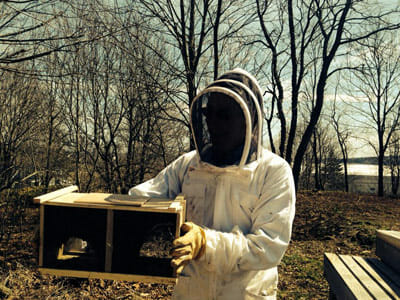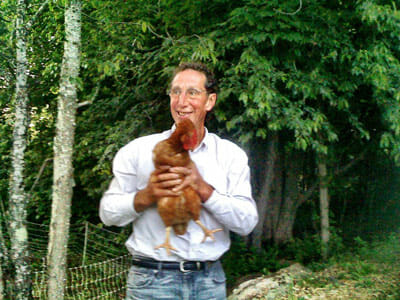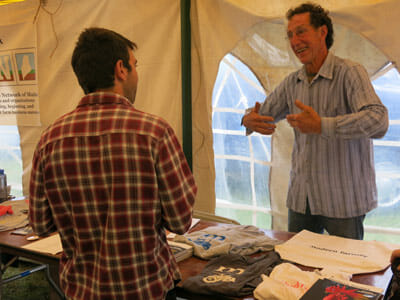Meet the Modern Farmer: Chris Hirsch
Jesse Hirsch: Hi Dad. I'm recording this call. Don't be mad. Chris Hirsch: Not mad.
Meet the Modern Farmer: Chris Hirsch
Jesse Hirsch: Hi Dad. I'm recording this call. Don't be mad. Chris Hirsch: Not mad.

Jesse Hirsch: Hi Dad. I’m recording this call. Don’t be mad.
Chris Hirsch: Not mad.
JH: So what was your career before?
CH: I started as a clinical respiratory therapist. Then somehow I stood in the wrong line and ended up in an administrative position — Director of Pulmonary Services at Maine’s biggest hospital. I ended up in a position where I might not even see someone who had seen a patient in 24 hours.

JH: Did you enjoy it on some level?
CH: I loved it the same way I love a lot of things when they’re new. But after a certain number of years I was sitting in meetings, facing my staff, thinking “I’ve heard this before, I’ve done this before.” Guess I was jaded? I just realized someone in my position should be more invested in the work.
JH: Working in your office, under the fluorescent lights, did you dream of farming?
CH: When my mind would wander, I would think about my garden. I always had a garden, except when I lived in downtown Boston. It provided me sanity, fulfilled me in a way that sitting under fluorescents didn’t.
JH: How did gardening help you?
CH: I don’t want to sound Pollyanna or trite, but something about putting seeds in the ground or even just turning over soil — you’re doing something kind of miraculous when you end up with a carrot or a head of lettuce.
JH: Let’s talk about the ’60s. I’ve seen pictures of you with an Afro, wearing a dashiki. Just a cool dude doing cool stuff. Tell me about the commune you started.
CH: My brother Greg and I were in San Francisco and we had a friend who owned a small piece of land in Maine. He was probably going to jail for resisting the draft, and he asked if we’d like to farm his property. We thought, “Yeah that sounds good, let’s go and be self sufficient.” So we hitchhiked across the country, only stopping in D.C. to go to the Library of Congress. I think that’s where we went? Some library.
JH: “Some building or something.” So many drugs, dad.
CH: Ha ha. Anyway we found the Rodale Institute book and the encyclopedia of gardening. We handwrote a bunch of notes on what we needed to do, then headed north. When we arrived in Maine in April, there was snow everywhere. As the snow melted, we found out it was basically just a swampy backyard, probably a half-acre with tires and other things buried in the ground.
It was tough getting it to be a garden but it worked. Initially it was just me and my brother. Then a bunch of refugees from San Francisco were like “Yeah sure that sounds good, we can farm.” We ended up with 10 or 12 people there, all with their own melodrama. It ended up being not really about self-sufficiency. Some other spirit took over.
She could tell this wasn’t some ‘I want to be a farmer when I grow up’ fantasy.
JH: Bummer. Let’s flash forward a bit. You quit your hospital job in 2011. Did you know right away you were going to work with the land?
CH: Well I had always loved bringing fresh produce from my garden and having someone turn it into beautiful food. But you’ve seen my garden. I could always grow more than (my wife) Janey and I could consume. So I thought it would be great to grow for a restaurant with a chef doing wonderful things. I’m still not sure how I ever got hired, what with having no professional experience.
JH: I remember you called to ask me about farm to table buzzwords. Like “How do I talk to a chef about this stuff?” You seemed really nervous you wouldn’t get the job.
CH: Yeah I was pretty nervous. I also got worried when I didn’t hear from the chef for awhile after I applied. Guess I should have realized that hiring a part-time gardener wasn’t her primary focus. The fact that she didn’t answer my email the same day I sent it, I took it very personal.
JH: Was the chef skeptical of your Palmolive-soaked hands? You were an office worker.
CH: Not really. I think she could tell this wasn’t some “I want to be a farmer when I grow up” fantasy. Gardening had always been a part of my life; I think that won her trust.
JH: I bet there was a steep learning curve. I mean, you had to tend to chickens and pigs and bees.
CH: Oh yes. Even the garden stuff was new to me. I was used to a home garden, which is very different than making sure you have a steady supply of menu staples throughout a growing season.
JH: How much of the restaurant’s produce do they source on site?
CH: At the top of their game, between 70 and 80 percent.
JH: That’s pretty good! Tell me about any rookie mistakes you made.
CH: The first time my boss showed me how to deal with chickens, I hadn’t mastered the mechanics of getting my body over the fencing. My foot got all tangled up. I didn’t fall into chicken shit, which is good. But it was close.
JH: For this story I kind of wish you had. It’s funnier if you fall in shit.
CH: Right.

JH: I heard you’ve had some troubles with the bees.
CH: Yes I’m their beekeeper now, though I have a mentor who helps out during the season. The hives have been struggling. We had five hives, now we’re down to three. It’s a bummer. We’re trying to stay as organic as possible, but I’m not sure. I think sometimes bees in cultivation might need extra help. At times it seems obvious the problem is varroa mites. I wonder if we should treat them.
JH: You said your boss was 28 when you started there. Is it weird working with the younguns?
CH: Generally no. Though what’s important in their lives isn’t necessarily what’s important in my life.
JH: What are you saying?
CH: Let’s just say there are times I’m glad I can’t hear them talking: “Oh my god oh my god oh my god!”
JH: I think it’s ‘omg’, dad.
CH: No no, I like their energy. Of course my wife thinks it’s weird that I’m surrounded by kids in their 20s, and my old friends think I’m into it because I’m lecherous.
JH: Okay, let’s wrap this up. Final thoughts. Would you recommend people toss away their day jobs, to become modern farmers?
CH: Frankly it depends what their financial situation is, or what struggles they’re willing to accept. I had retirement savings when I took this on, and a partner, but if I was your age, I’d have to think long and hard about it.
Chris Hirsch works at Primo Restaurant, in Rockland, Maine.
Follow us
This work is licensed under a Creative Commons Attribution-NoDerivatives 4.0 International License.
Want to republish a Modern Farmer story?
We are happy for Modern Farmer stories to be shared, and encourage you to republish our articles for your audience. When doing so, we ask that you follow these guidelines:
Please credit us and our writers
For the author byline, please use “Author Name, Modern Farmer.” At the top of our stories, if on the web, please include this text and link: “This story was originally published by Modern Farmer.”
Please make sure to include a link back to either our home page or the article URL.
At the bottom of the story, please include the following text:
“Modern Farmer is a nonprofit initiative dedicated to raising awareness and catalyzing action at the intersection of food, agriculture, and society. Read more at <link>Modern Farmer</link>.”
Use our widget
We’d like to be able to track our stories, so we ask that if you republish our content, you do so using our widget (located on the left hand side of the article). The HTML code has a built-in tracker that tells us the data and domain where the story was published, as well as view counts.
Check the image requirements
It’s your responsibility to confirm you're licensed to republish images in our articles. Some images, such as those from commercial providers, don't allow their images to be republished without permission or payment. Copyright terms are generally listed in the image caption and attribution. You are welcome to omit our images or substitute with your own. Charts and interactive graphics follow the same rules.
Don’t change too much. Or, ask us first.
Articles must be republished in their entirety. It’s okay to change references to time (“today” to “yesterday”) or location (“Iowa City, IA” to “here”). But please keep everything else the same.
If you feel strongly that a more material edit needs to be made, get in touch with us at [email protected]. We’re happy to discuss it with the original author, but we must have prior approval for changes before publication.
Special cases
Extracts. You may run the first few lines or paragraphs of the article and then say: “Read the full article at Modern Farmer” with a link back to the original article.
Quotes. You may quote authors provided you include a link back to the article URL.
Translations. These require writer approval. To inquire about translation of a Modern Farmer article, contact us at [email protected]
Signed consent / copyright release forms. These are not required, provided you are following these guidelines.
Print. Articles can be republished in print under these same rules, with the exception that you do not need to include the links.
Tag us
When sharing the story on social media, please tag us using the following: - Twitter (@ModFarm) - Facebook (@ModernFarmerMedia) - Instagram (@modfarm)
Use our content respectfully
Modern Farmer is a nonprofit and as such we share our content for free and in good faith in order to reach new audiences. Respectfully,
No selling ads against our stories. It’s okay to put our stories on pages with ads.
Don’t republish our material wholesale, or automatically; you need to select stories to be republished individually.
You have no rights to sell, license, syndicate, or otherwise represent yourself as the authorized owner of our material to any third parties. This means that you cannot actively publish or submit our work for syndication to third party platforms or apps like Apple News or Google News. We understand that publishers cannot fully control when certain third parties automatically summarize or crawl content from publishers’ own sites.
Keep in touch
We want to hear from you if you love Modern Farmer content, have a collaboration idea, or anything else to share. As a nonprofit outlet, we work in service of our community and are always open to comments, feedback, and ideas. Contact us at [email protected].by Jesse Hirsch, Modern Farmer
January 23, 2015
Modern Farmer Weekly
Solutions Hub
Innovations, ideas and inspiration. Actionable solutions for a resilient food system.
ExploreExplore other topics
Share With Us
We want to hear from Modern Farmer readers who have thoughtful commentary, actionable solutions, or helpful ideas to share.
SubmitNecessary cookies are absolutely essential for the website to function properly. This category only includes cookies that ensures basic functionalities and security features of the website. These cookies do not store any personal information.
Any cookies that may not be particularly necessary for the website to function and are used specifically to collect user personal data via analytics, ads, other embedded contents are termed as non-necessary cookies.